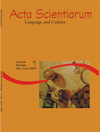<b>Batuque: the identity in the bodies</b> - DOI: 10.4025/actascilangcult.v30i2.3739
Abstract
Analyzing the uses of History as the parodic use of reality, the dissociative use of identity and the sacrificial use of truth, Michel Foucault investigates the meaning of History from the perspective of genealogy. Genealogy discloses that origin as traditional conceived, as a linear factor, is problematic as a truth attributed by knowledge (or desire-knowledge) involving mankind. The desire-knowledge on our origin and our destiny has stimulated several reflections on identity, history and truth. Nevertheless, what does identity mean when a genealogical character is attributed to it? Based on Nietzsche’s suppositions, the French philosopher presents two explanations to this discussion: emergency or the point of arising as a possibility for reflections on origin (Entstehung in German),or the body as a surface of events’ inscriptions (Herkunft in German). The latter explanation will be the underlying basis for a discussion on the batuque, an Afro-Brazilan dance and music, as a praxis that institutes and constitutes the identity of Afrodescendents populations in BrazilDownloads
DECLARATION OF ORIGINALITY AND COPYRIGHTS
I Declare that current article is original and has not been submitted for publication, in part or in whole, to any other national or international journal.
The copyrights belong exclusively to the authors. Published content is licensed under Creative Commons Attribution 4.0 (CC BY 4.0) guidelines, which allows sharing (copy and distribution of the material in any medium or format) and adaptation (remix, transform, and build upon the material) for any purpose, even commercially, under the terms of attribution.
Read this link for further information on how to use CC BY 4.0 properly.




















6.png)









